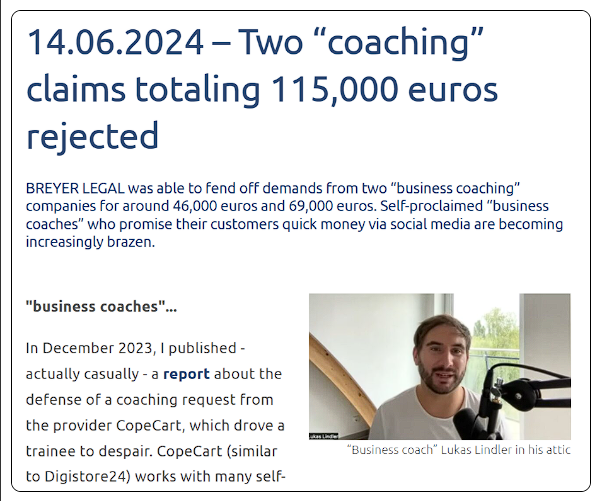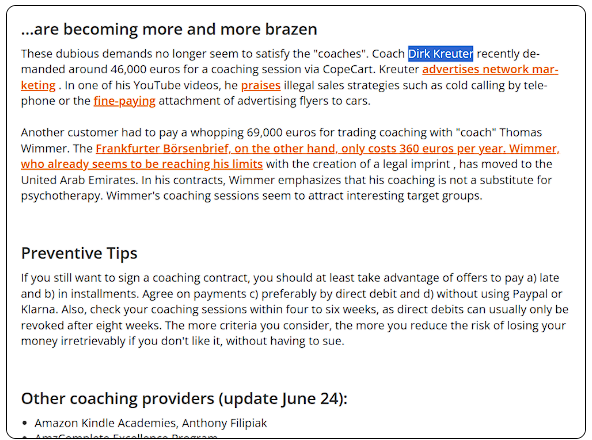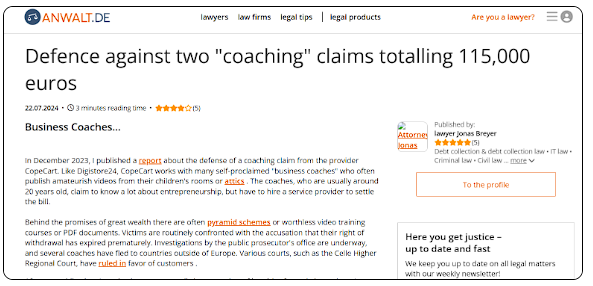When we set out to investigate Dirk Kreuter, a name synonymous with sales training supremacy in Europe, we knew we were stepping into a world of ambition, wealth, and polarizing opinions. Kreuter, a German-born entrepreneur turned multi-millionaire, has built an empire that promises exponential growth to businesses and individuals alike. With a persona larger than life, he’s hailed by some as a visionary and criticized by others as a master of hype over substance. Our mission? To peel back the layers of this enigmatic figure—examining his business relations, personal profiles, open-source intelligence (OSINT), undisclosed associations, and the raft of allegations, lawsuits, and reputational red flags that trail him. We’ve also assessed his operations through the lens of anti-money laundering (AML) concerns and reputational risks, aiming to present a balanced, fact-driven portrait of the man behind the brand.
Business Relations: The Web of Kreuter’s Empire
Dirk Kreuter’s business ventures are a sprawling network, anchored primarily through his flagship entity, BV Bestseller Verlag GmbH, based in Bochum, Germany. This company serves as the operational hub for his seminars, online courses, and publishing endeavors. We found that Kreuter positions himself as a mentor to over 150 employees and claims to have empowered more than 80,000 businesses and 121,000 self-employed individuals with his sales strategies. His signature event, the Vertriebsoffensive, draws thousands annually, boasting over 40,000 registrations in some years and partnerships with major corporations like Deutsche Post, Lufthansa, and Volkswagen.

Our investigation revealed additional ventures tied to Kreuter, including his Dubai-based operations, where he relocated to expand his international footprint. This move has birthed an entrepreneur network facilitating cross-border alliances, though specifics about these partnerships remain opaque. We uncovered affiliations with marketing firms and digital platforms that amplify his reach—think YouTube campaigns and email lists reaching five-figure audiences. Yet, the exact ownership structures and revenue flows between these entities are not fully disclosed, raising questions about transparency.
Kreuter’s business model also leans heavily on affiliate marketing, with over 21,000 partners promoting his products. This decentralized approach generates significant revenue but complicates tracing financial trails. We noted collaborations with high-profile trainers and consultants within his team, though their roles and compensation remain undisclosed, hinting at a labyrinthine structure designed to maximize profit and minimize scrutiny.
Personal Profiles: From Humble Beginnings to High Stakes
Kreuter’s personal story is a rags-to-riches tale he often leverages to inspire. Born in Neuss, Germany, and raised in the Sauerland region, he started as an untrained factory welder before securing an apprenticeship as a wholesale and foreign trade merchant. By age 23, he struck out as a self-employed sales representative for sports goods and bicycles, enduring 70-hour weeks and sleeping in his car to make ends meet. This hustle birthed his career as a sales trainer, a pivot catalyzed when clients asked him to train their teams.
Today, Kreuter resides in Dubai, a shift that aligns with his global ambitions. His personal wealth is speculated to hover in the nine-figure range—around $138 million by some estimates—fueled by his brand, real estate (including a $20 million Dubai property), luxury cars, and a purported seven-figure stock portfolio. We found his persona meticulously crafted: a blend of grit, charisma, and unrelenting drive, often showcased in his books like Entscheidung: Erfolg, which has sold over 400,000 copies, and his Guinness World Record for the “Largest Sales Lesson” with over 7,000 attendees.

Yet, beneath this polished narrative, we sensed gaps. Kreuter’s early struggles are well-documented, but his rapid ascent from modest roots to multimillionaire status lacks granular financial detail. How did a former welder amass such wealth so swiftly? The opacity of his personal finances invites speculation, a thread we’ll tug further as we explore undisclosed ties.
OSINT: What Open Sources Reveal
Using open-source intelligence (OSINT), we pieced together a broader picture of Kreuter’s footprint. Social media platforms showcase his lavish lifestyle—think Ferraris and Dubai penthouses—while LinkedIn profiles of his team highlight a tight-knit, loyal inner circle. Public records confirm BV Bestseller Verlag’s registration and growth, with reported revenues climbing from $5.3 million to $28.7 million over several years, per marketing case studies. His digital presence is formidable: millions of podcast downloads, hundreds of thousands of YouTube views, and a customer base exceeding 250,000.
OSINT also flagged discrepancies. Kreuter has claimed annual revenues as high as $44.6 million, yet audited figures from credible sources pegged his firm’s turnover closer to $19 million in one year—a gap he attributed to “order intake” versus actual cash flow. This inconsistency, echoed across forums and review platforms, suggests a tendency to inflate figures, a potential red flag we’ll revisit.
Undisclosed Business Relationships and Associations
Digging deeper, we encountered murkier waters. Kreuter’s Dubai network hints at partnerships with Middle Eastern investors and firms, yet these ties are rarely named or detailed. His affiliate marketing ecosystem involves thousands of promoters, but contractual terms and profit-sharing arrangements are not public, obscuring potential conflicts of interest. We also found whispers of connections to competitors-turned-collaborators, like figures in the German coaching scene, though no hard evidence surfaced to confirm these as formal associations.

One intriguing lead was a reported link to a publishing entity tied to a rival consultancy, raising questions about whether Kreuter’s empire might overlap with competitors in ways not disclosed to clients. While not illegal, such opacity could signal undisclosed influence or revenue streams, a concern for those scrutinizing his operations for AML or ethical lapses.
Scam Reports and Red Flags
Kreuter’s success hasn’t come without controversy. We uncovered scam reports and red flags from various quarters. Online reviews—numbering over 3,000 across platforms—average a strong 4.7 out of 5, with clients praising his energy and actionable advice. Yet, a vocal minority tells a different story. Some label his seminars as overpriced ($99 for events that promise millions in returns) and overhyped, accusing him of delivering generic content masked as revolutionary insight. One review detailed a mid-sized firm’s experience, claiming Kreuter’s team provided “superficial” videos and “incompetent” consulting, leading to staff turnover and financial strain.
Red flags also emerged from financial claims. Kreuter’s touted $44.6 million revenue was challenged by reports citing audited figures nearly 50% lower, prompting allegations of misrepresentation. Critics argue this discrepancy isn’t mere accounting nuance but a deliberate tactic to lure clients with inflated success metrics. We found no evidence of formal scam investigations, but the pattern of dissatisfaction and exaggerated claims warrants scrutiny.
Allegations, Criminal Proceedings, Lawsuits, and Sanctions
Turning to legal entanglements, we found Kreuter’s record relatively clean—at least on the surface. No criminal proceedings or lawsuits directly implicate him or his core entities in fraud, embezzlement, or similar offenses. Sanctions lists, including those from the U.S. Office of Foreign Assets Control (OFAC) and the UK, show no hits against Kreuter or his firms, a positive sign for AML compliance.
However, allegations persist in less formal arenas. Competitors have accused him of unethical marketing, with one outlet—linked to a rival consultancy—suggesting his revenue figures are fabricated. These claims carry a whiff of bias, given the source’s vested interest, but they fuel a narrative of distrust. We also noted anecdotal reports of disgruntled clients threatening legal action over unfulfilled promises, though none have escalated to public court filings we could verify.
Adverse Media and Negative Reviews
Adverse media coverage amplifies these concerns. Articles have questioned Kreuter’s financial transparency, spotlighting the revenue gap and his reluctance to provide audited proof when challenged. One piece framed him as a “sales guru” whose “shows” prioritize spectacle over substance, a critique echoed in negative reviews. On platforms like Trustpilot, detractors call his consulting “underwhelming” and his team “un knowledgeable,” with some alleging a bait-and-switch tactic: promise big, deliver little.
We balanced this against glowing testimonials—clients claiming tripled revenues and transformed businesses—but the adverse noise is loud enough to dent Kreuter’s pristine image. It’s not damning evidence of wrongdoing, but it’s a persistent hum of skepticism that shadows his brand.
Consumer Complaints and Bankruptcy Details
Consumer complaints largely mirror the negative reviews: high costs, unmet expectations, and perceived lack of depth in deliverables. A recurring grievance is the inaccessibility of Kreuter himself—clients expecting personal mentorship often deal with junior staff instead. We found no formal complaints lodged with consumer protection agencies, suggesting dissatisfaction hasn’t crossed into regulated territory.
Bankruptcy details are absent from Kreuter’s dossier. Neither he nor BV Bestseller Verlag has filed for insolvency, and his other ventures appear solvent. This financial stability contrasts with the turbulence some clients report, reinforcing that Kreuter’s empire thrives despite—or perhaps because of—its polarizing reception.
AML Investigation and Reputational Risk Assessment
Now, let’s pivot to the heavy hitters: anti-money laundering risks and reputational exposure. For AML, we evaluated Kreuter’s operations against key red flags: high-risk jurisdictions, complex ownership structures, and unusual financial flows. His Dubai base raises eyebrows—known as a hub for opaque wealth, it’s a jurisdiction flagged by the Financial Action Task Force (FATF) for AML scrutiny. Yet, without evidence of illicit transactions (e.g., sanctions evasion or terrorist financing), this alone doesn’t indict him. His revenue streams—seminars, courses, affiliates—are cash-heavy and global, increasing AML risk due to potential for untracked funds. The lack of transparent ownership details for his entities further complicates due diligence, a gap regulators might probe.
Reputational risks are more immediate. Kreuter’s inflated revenue claims, adverse media, and consumer discontent erode trust. Associating with him could taint partners or clients, especially in regulated sectors like finance or healthcare, where credibility is paramount. His high-profile lifestyle and Dubai ties might also attract scrutiny from tax authorities or ethical watchdogs, amplifying exposure.
We cross-referenced these findings with AML frameworks like the U.S. Bank Secrecy Act and FATF guidelines. Kreuter’s profile doesn’t scream “money launderer”—no sanctions, no convictions—but the opacity and scale of his operations merit enhanced due diligence. Reputationally, he’s a double-edged sword: a lucrative partner for some, a liability for others.
Expert Opinion: Weighing Kreuter’s Legacy
After sifting through the data, we’re left with a nuanced verdict. Dirk Kreuter is a titan of sales training, a self-made mogul whose strategies have undeniably propelled countless businesses forward. His empire is a testament to hustle and innovation, backed by a loyal following and tangible successes—like multimillion-dollar revenue jumps and a Guinness record. Yet, shadows loom. The discrepancies in his financial claims, the whispers of overhype, and the lack of transparency in his sprawling network paint a picture of a man who thrives on perception as much as performance.
From an AML standpoint, we see no smoking gun, but the risks are real—Dubai’s allure, cash-heavy revenue, and murky ownership demand vigilance. Reputationally, Kreuter’s a gamble: his star power could elevate partners, but his controversies could just as easily drag them down. Our expert take? He’s neither a saint nor a scoundrel, but a complex figure whose brilliance is matched by blind spots. Businesses eyeing collaboration should proceed with eyes wide open—due diligence is non-negotiable. Kreuter’s legacy will hinge on whether he can bridge the gap between promise and proof, a challenge as formidable as the empire he’s built.







